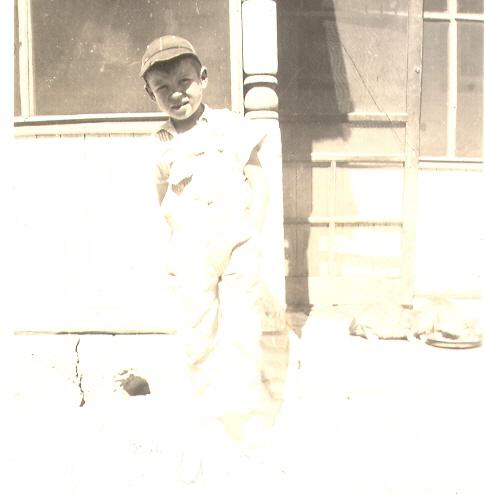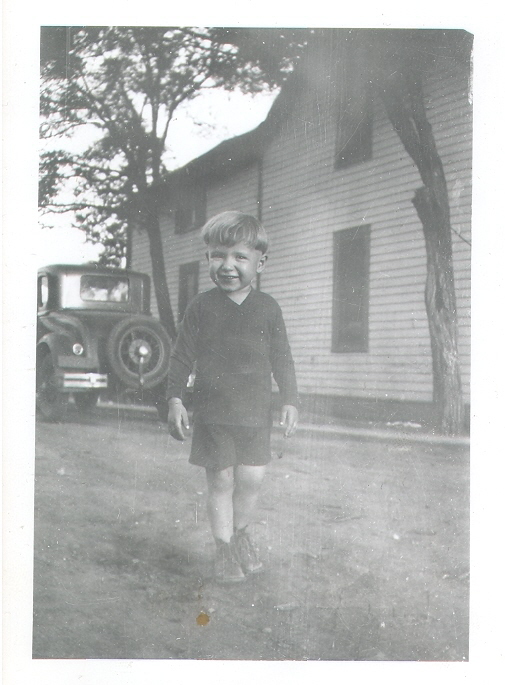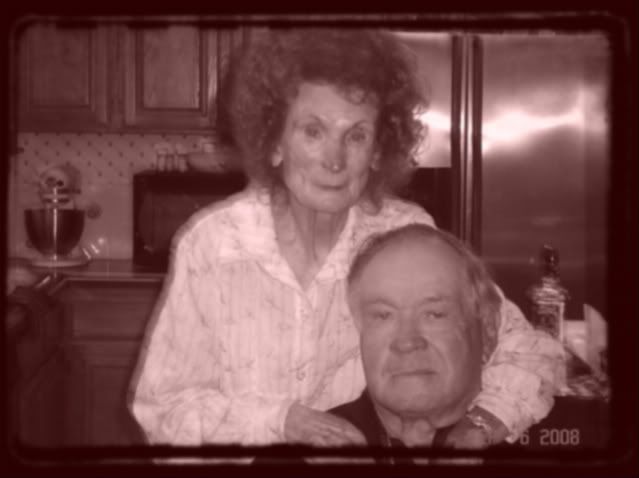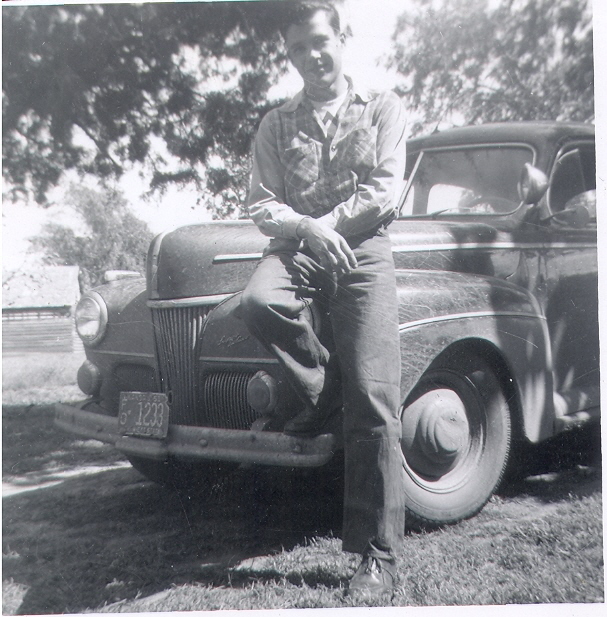TRANSCRIPTION
What was your childhood like during the great depression?
Well I grew up in western Kansas in the thirties when the wind blew hard and the dust would be so bad it would almost choke you to death. It was very tough. It wasn't very unlikely to be standing out and see a roll of dust come rolling in that looked like a fog bank. But it was the time of the times and everybody pretty well learned to live with it and the old farmers out there tried to get a crop by if they could.
What affect did the dust bowls have on your farming?
Well, yeah it really did because basically it was a drought season it was very dry and often farmers lost most of their crops, if they got any crop at all and of course the prices during the depression weren't very good so it was a pretty hard struggle and a lot of them didn't survive it.
Did your dad have money invested in the stock market?
Not big time, the farmers had a little different attitude. They really tried to make their farms do pay out to be their retirement. It wasn't likely due today to be investing in the stock market. There were a few of them that did and of course a lot of them got caught in that too, but the farmers in their own right weren't hardly saving any money at all. They were just trying to survive day to day almost.
At what age did you have to start working on your family farm and what was your role?
Well the farm children were early on assigned jobs to do and relative to their age. I brought in firewood. I hulled water from the well into the house we didn't have running water so we had to bring it in, in a cream can…a five gallon can everyday. And as I said my job as a young man was to bring in the wood and coal those types of things. As a got older I had to get milk and those type of things such as feed the cows and pigs and whatever was there. As I got older I drove the tractor and plowed and the farm work.
What were the hospitals like during the time of your injury are they totally different from today?
Oh my goodness yes. The hospital in those days was probably not even as good as the rest homes of today. They had one room or might have had two that they classified as an operating room. Of course all the hospitals smelled of ether because that was their only anesthetic that was available. Cleanliness was kind of a relative word, but of course we didn't have the antibiotics I don't even think we had the diseases that are present today either.

Did you have anesthesia with your surgery?
Yeah, every time they had to cut on me they fed me ether. Oh I hated that stuff! Man, oh man that was bad. It smelt so bad that it made you sick. I never took a dose of ether that I didn't get sick afterwards.
When did your family get indoor plumbing and electricity and how did it affect your life?
My family had indoor plumbing when we moved to the city. It didn't affect my life that drastically. I will say this much, we had a big storage tank by the window that pumped water through. During the summer spring and fall we had running water in the house, but as far as a bathroom or anything no we did not have. We had an outhouse we went to. For the toilet and bathing was done in the summer from sun warmed hot water, a 50-gallon barrel. In the winter time you bathed in a big ole' washtub.
What is your favorite memory of growing up?
Oh, I don't know I had a lot of fun. It didn't occur to me that we were poor and we were, everyone was poor in the depression, but we survived and we had fun. We had card parties we went to and stuff at the church. Later as I got older we went to dances at the church and it was pretty much a community thing that we would periodically play cards or something like that.
Was your family real active in the church?
Agh, yes they were like everyone else they belonged to Sedulity and Nights of Columbus and all of those things. They did their part to support the church.
Where did you get your supplies for your home did you buy them or make most of them?
As far as food was concerned we bought some things at the store, but my mom made bread. She canned food. She canned peaches and fruit. And she canned vegetables and peas of those things in that nature that we grew in the garden.
How did your dad get "in" with the banker that helped you during the depression?
Oh dad owned part of that bank. Dad was a major investor in the bank and had been for years, probably since he was twenty to twenty-five years old. He bought stock in the bank in '29 when so many of the banks failed, three or four of the major bankers put everything they had to salvaging this particular bank to make sure it stayed afloat.
So the people that had major investments in his bank he would help them out with money?
Yeah, dad and John Gorge and John Feist. If you remember anything about the Feist phonebook thing, well Feist published a phonebook publically here all about Kansas that kind of replaced or was a supplement to AT&T or I mean Southwest Belle. Then they started a phone company. Well that was part of the people that owned the bank as a matter of fact they still own it.


How did you get grandmother's ring?
Dad got that ring from a guy that owned him money. We had loaned him money during the depression and the guy couldn't replace it so he gave dad that ring in replace of it.
What do you first recall when people ask you to recall the Great Depression?
Much of what I have told you, childhood I didn't have much sense to know that I was well off or not. I felt I was as I was supposed to be or things were as they were supposed to be.
What was it like to have a shortage on money?
I was too young to realize. I was only ten years old when World War II started in 1940's., well 1941 I was 11 years old. So really the depression was pretty well over at that time. So I was too much of a child to realize things were as bad as they were.
How do you remember the Great Depression ending? Do you think Franklin D. Roosevelt played a big part in helping?
Well I am quite sure he did. He preformed the WPA, which we called Worker's Progress Association. That let out and built bridges and shelterbelts. It was just kind of the government was paying these people that were desperate for jobs a little bit of money so that they could survive. Yes, Franklin Roosevelt was instrumental in getting us through this depression.
Did your farm have problem with grasshoppers?
Yes we had our share of them just like everybody else. They would come in by the billions and in big swarms. We had the poison out that did take care of a lot of it. Sometimes it was effective and sometimes it wasn't, but that was just the way things were. We had periodic invasions of grasshoppers.
What was it like having such a big family?
Interesting, of course I was a baby. That plus being injury I probably got the benefit of a lot of special treatment. We got along well. The older ones took care of the little ones. That was just the way big families worked.
What did your injury play a role on your life?
Well I like to think mom and dad both didn't really… I don't know quiet how to say it. They didn't give me that much special treatment. I still had my chores to do. I still had to do things just like they were. I never considered myself crippled. I couldn't run as fast as the other kids, but I was a pretty big sportsman. I could play ball. I played football and everything there was to play and I was pretty competitive. And the kids didn't treat me that way either. It wasn't a matter of that either. I only had one guy ever call me a cripple and I beat him up!


Do you think it would have been way different if you had injury today?
No I do not. Ashley you have got to understand it is a matter of attitude and how your parents handle it. I think about often trying to contact the little boy over here that his lost his legs when he got ran over by the train because he had a real bad attitude and I don't know if he ever got over it. I was never treated any different. I did everything I ever wanted to do. There were limitations I knew I could never get out of, but by large I did everything I needed to do.
Do you have any regrets or do you think you got the best out of it?
Oh, we all have regrets dear. There wasn't anything that you couldn't do anything about, but I have spent the last 58 happiest years of my life being married to your grandmother and I wouldn't change one second of it.
Do you have any word of advice you think I should know for my life ahead?
Just be aware that things don't change quickly. Don't get upset and if you do get upset give it time to set down and heal. These things aren't going to happen and get fixed over night sometimes.
How did you and grandma meet and go on your first date?
Ha, I had to trick her! Well I had one of the girls she worked with set it up so she would go to the show together and once they got there she would disappear and I would show up in her place! Grandma and I set down and watched the show together and that is how it all started.
Was it hard for you even after the time of meeting grandma with money?
Oh, always we had real tough times with money. I had to go through three or four jobs. Ever since I went out on my own I can't ever say I went completely out of money, but I have had some tough times.
Did anyone kill himself or herself due to the great depression back then? Did you hear much about suicides?
As far as being out on the country as a farmer we didn't have news and televisions we had today. We had a daily newspaper that came out of Hutchinson and you got spoon fed whatever information you got. There wasn't adequate information put out. A farmer was a farmer and if he didn't make it he went down the road and started somewhere else. Read the Grape of Wrath and places like that and that is how California got populated. People moved out of Oklahoma during the great depression.


Were people allowed to fill bankruptcy back then?
Yes they went bankrupt. I think the recovery was tougher. They didn't have ready access to jobs many of them had to do the best they could. They got on well fare or anything they could get.
Describe a typical day for you during the great depression?
Get up do my chores, go to school, come home do my chores and go to bed when the sun went down. I went and got coal for the fire, brought the water in. As I got older I did the milking, separated the cream, brought the hay in, and feed the cows and the hogs.
Was it rare to go to college in that day?
I went to college. I went to Oklahoma for one year. No it was not rare because I went during 1949 or 1950 and that was after World War II so all of these veterans were coming home from the service and going back to college. It was readily available.
Describe your life in a six-word memoir.
I did the best I could.

